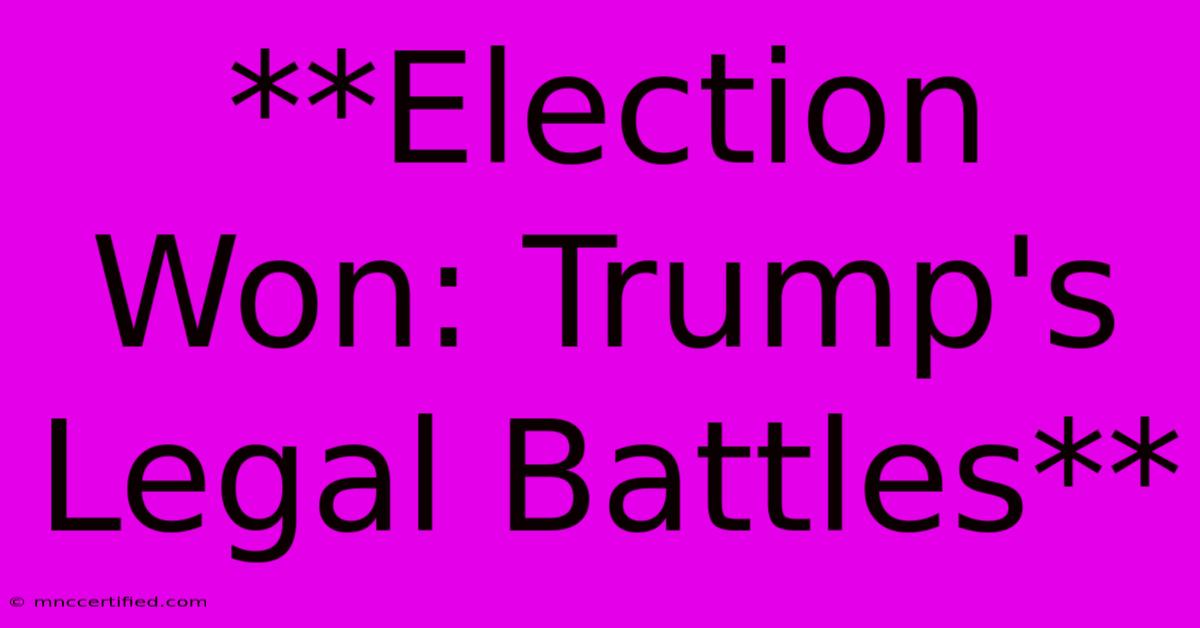**Election Won: Trump's Legal Battles**

Table of Contents
Election Won: Trump's Legal Battles – A Look at the Post-2020 Election Litigation
The 2020 US Presidential election was highly contested, with Donald Trump making numerous claims of widespread voter fraud. Following his defeat, Trump and his allies initiated a series of legal challenges in various states, aiming to overturn the election results. These legal battles garnered significant media attention and sparked intense debate about election integrity and the legal process.
The Scope of the Litigation
Trump's legal team filed dozens of lawsuits across several battleground states, primarily focusing on allegations of voter fraud, irregularities, and procedural errors. These claims largely centered around:
- Mail-in voting: The increase in mail-in ballots due to the COVID-19 pandemic was a focal point, with accusations of widespread fraud and illegal voting practices.
- Vote counting irregularities: Trump's legal team alleged numerous instances of ballot miscounts, duplicate votes, and unauthorized ballot access.
- Lack of voter ID requirements: The absence of strict voter ID laws in some states was cited as a vulnerability for voter fraud.
Key Legal Challenges
While the Trump campaign and its supporters pursued numerous legal avenues, several cases gained particular prominence:
- Pennsylvania: The Trump campaign challenged the state's mail-in ballot rules, arguing they violated the Constitution. The case reached the Supreme Court, but the court declined to intervene.
- Michigan: A case challenging the state's election certification process was dismissed by the Michigan Supreme Court.
- Georgia: A lawsuit alleging voter fraud was dismissed by a federal judge, with no evidence to support the claims.
The Outcome
The vast majority of Trump's legal challenges were dismissed by courts at various levels, including state and federal courts. Judges often cited a lack of credible evidence to support the allegations of voter fraud and irregularities. The Department of Justice, under then-Attorney General William Barr, also found no evidence of widespread fraud that could have affected the election outcome.
The Impact
While the lawsuits failed to overturn the election results, they had a significant impact on the political landscape:
- Erosion of public trust: The repeated claims of voter fraud, despite lack of evidence, fueled distrust in the electoral process.
- Political polarization: The legal battles exacerbated existing political divisions, creating a climate of suspicion and animosity.
- Legislative changes: The lawsuits prompted some states to consider enacting stricter voting laws, potentially disenfranchising certain voters.
Looking Ahead
The 2020 election litigation serves as a cautionary tale about the importance of factual accuracy, evidence-based claims, and the proper use of legal processes in addressing electoral disputes. As the nation continues to grapple with its political divisions, ensuring fair and credible elections remains a crucial task for maintaining democratic institutions.

Thank you for visiting our website wich cover about **Election Won: Trump's Legal Battles**. We hope the information provided has been useful to you. Feel free to contact us if you have any questions or need further assistance. See you next time and dont miss to bookmark.
Featured Posts
-
Market Rally Dow Gains 1500 Points Today
Nov 07, 2024
-
Market Rally Continues Indices Hit All Time Records
Nov 07, 2024
-
Does Home Insurance Cover A Broken Window
Nov 07, 2024
-
Dogecoin Surges After Trump Election Win
Nov 07, 2024
-
Election Updates Breed Behind In Sf
Nov 07, 2024